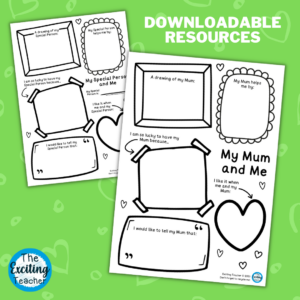'Pocket the Nervous Jitters' Activity: Exploring Feeling Frightened, Scared, Afraid or Nervous

‘Pocket the Nervous Jitters’ is an activity that helps children to tackle pesky feelings of being scared, nervous, afraid, and frightened. So, let’s get to it and show those jitters who’s boss!
Sometimes we feel nervous, people call this ‘having the jitters’. Write down the things that make you feel nervous on each of the ‘Nervous Jitters’. Decorate your ‘Happy Pocket’ and glue the two pockets around the edge leaving an opening at the top of the pocket. Cut out your Jitters and add them to your pocket. Next time you feel nervous, think about all the things that make you feel happy and tell yourself, ‘I am brave’.
How can this resource be used?
- To support children 1:1 in therapy sessions, such as CBT sessions.
- To normalise talking about worries and ways of coping with them.
Relevant Curriculum Links:
England PSHE – Which statutory PSHE curriculum* objectives does this resource fall into? *in line with the PSHE Association 2021 Statutory Guidance.
KS1:
- H11. about different feelings that humans can experience.
- H12. how to recognise and name different feelings.
- H13. how feelings can affect people’s bodies and how they behave.
- H15. to recognise that not everyone feels the same at the same time, or feels the same about the same things.
- H17. about things that help people feel good (e.g. playing outside, doing things they enjoy, spending time with family, getting enough sleep).
- H18. different things they can do to manage big feelings, to help calm themselves down and/or change their mood when they don’t feel good.
- H19. to recognise when they need help with feelings; that it is important to ask for help with feelings; and how to ask for it.
KS2:
- H16. about strategies and behaviours that support mental health — including how good quality sleep, physical exercise/time outdoors, being involved in community groups, doing things for others, clubs, and activities, hobbies and spending time with family and friends can support mental health and wellbeing.
- H18. about everyday things that affect feelings and the importance of expressing feelings.
- H20. strategies to respond to feelings, including intense or conflicting feelings; how to manage and respond to feelings appropriately and proportionately in different situations.
- H21. to recognise warning signs about mental health and wellbeing and how to seek support for themselves and others.
- H22. to recognise that anyone can experience mental ill health; that most difficulties can be resolved with help and support; and that it is important to discuss feelings with a trusted adult.
Scottish Health and Wellbeing Curriculum Outcome(s):
- Mental and Emotional Wellbeing:
- I am aware of and able to express my feelings and am developing the ability to talk about them. HWB 0-01a / HWB 1-01a / HWB 2-01a / HWB 3-01a / HWB 4-01a.
- I know that we all experience a variety of thoughts and emotions that affect how we feel and behave and I am learning ways of managing them. HWB 0-02a / HWB 1-02a / HWB 2-02a / HWB 3-02a / HWB 4-02a.
- I understand that there are people I can talk to and that there are a number of ways in which I can gain access to practical and emotional support to help me and others in a range of circumstances. HWB 0-03a / HWB 1-03a / HWB 2-03a / HWB 3-03a / HWB 4-03a.
- I understand that my feelings and reactions can change depending upon what is happening within and around me. This helps me to understand my own behaviour and the way others behave. HWB 0-04a / HWB 1-04a / HWB 2-04a / HWB 3-04a / HWB 4-04a.
- I understand the importance of mental wellbeing and that this can be fostered and strengthened through personal coping skills and positive relationships. I know that it is not always possible to enjoy good mental health and that if this happens there is support available. HWB 0-06a / HWB 1-06a / HWB 2-06a / HWB 3-06a / HWB 4-06a.
More amazing resources you might like:
- All
- 5 Point Scale
- Displays
- EYFS
- Emotional Literacy
- Emotional Regulation
- Emotions and Feelings
- Families and Close Positive Relationships
- Goal Setting
- KS1
- KS2
- Keeping Safe
- Let's Journal
- Mindfulness
- Respecting Self and Others
- SEND
- Self-Regulation
- The Scribbles Crew
- Zones of Regulation

What emergency service do I need?

‘My Mum and Me’: Mother’s Day Activity (including Special Person Edition)

It’s okay if I lose… Social Story about Sportsmanship, Losing and Winning

World Cup inspired Football Resources: Regulation Zones Prompts

Design Your Own Pride 50P Coin

SMART Goals Poster: Setting Goals & Achievements

Let’s Journal: ‘Spotting Plants and Flowers in Nature’ Journaling Prompt Sheet

Feelings Volcano Display

My Feelings Traffic Light: Self Regulation Toolkit for Children

List the Positives
Share this resource:
Request a Resource
Want to request or suggest a resource? Pop us a message below and we will see what we can do. We are not able to respond directly to all requests but be rest assured, we are reading them and constantly updating the resource bank accordingly to all your fabulous ideas!
